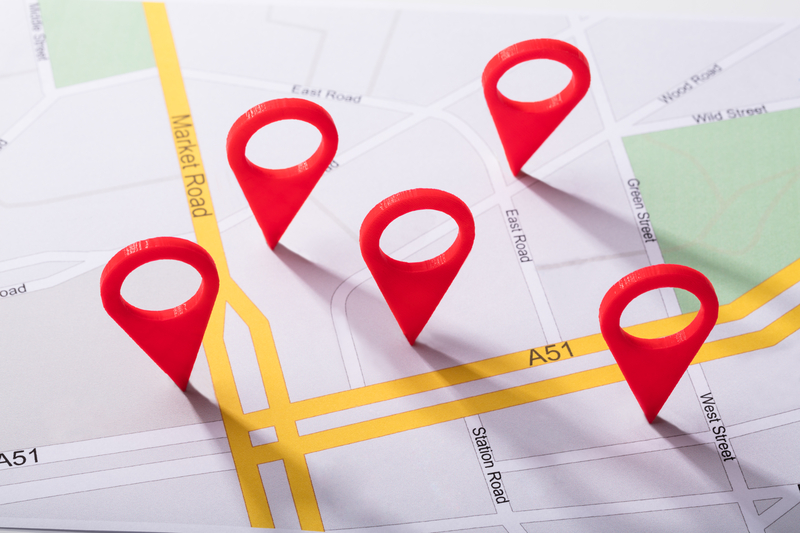
Photo: Andrey Popov | Dreamstime.com
Using location data responsibly in cities and local government
07 October 2021
By: Ben Hawes, an associate director at the UK Connected Places Catapult, and one of the joint authors of the Locus Charter.
City and local governments increasingly recognise the power of location data to help them deliver more and better services, exactly where and when they are needed. The use of this data is going to grow, with more pressure to manage resources and emerging challenges including responding to extreme weather events and other climate impacts.

But using location data to target and manage local services comes with risks to the equitable delivery of services, privacy and accountability. To make the best use of these growing data resources, city leaders and their teams need to understand those risks and address them, and to be able to explain their uses of data to citizens.
The Locus Charter, launched earlier this year, is a set of common principles to promote responsible practice when using location data. The Charter could be very valuable to local governments, to help them navigate the challenges and realise the rewards offered by data about the places they manage.
Managing with data: Know the risks to realise the gains
Across many domains, including consumer internet services, healthcare and recruitment, it has become clear that using data to manage functions offers opportunities and efficiencies, but also brings characteristic risks. These include harms from bias in datasets and from automating already unfair processes, lack of transparency and explainability, and intrusions into privacy.
Location data is in this respect not different. Location data applications – along with artificial intelligence and the Internet of Things – are part of the current ‘Fourth Industrial Revolution’ wave of enabling data technologies. The types and volumes of location data now available offer huge potential to apply more targeted solutions in the right places. That capability comes with risks that need to be recognised and managed, to gain the benefits of the applications for everyone.
Data ethics for cities and local governments
Compared to private companies, local public bodies already have special responsibilities to ensure transparency and fairness. New sources of data can help, but can also generate new questions. Local governments have generally been able to improve services as they learned more about the people they served. Now they must manage the risks of knowing too much about people, and acting intrusively. They can also risk distorting service provision because their data about people in places is uneven or unrepresentative.
Many city and local governments fully recognise that data-driven delivery comes with risks, and are developing specific local data ethics frameworks to guide their work. Some of these, like Kansas City’s, are specifically aimed at managing data privacy. Others cover broader uses of data, like Greater Manchester’s Declaration for Intelligent and Responsible Data Practice (DTPR). DTPR is an open source communication standard that helps people understand how data is being used in public places.
London is engaging citizens on an Emerging Technology Charter, to explore new and ethically charged questions around data. Govlab supports an AI Localism repository of actions taken by local decision-makers to address the use of AI within a city or community. The EU Sherpa programme (Shaping the Ethical Dimensions of Smart Information Systems) includes a smart cities strand, and has published a case-study on the Ethics of Using Smart City AI and Big Data.
Smart city applications make it potentially possible to collect data in many ways, for many purposes, but the technologies cannot answer questions about what is appropriate. In The Smart Enough City: Putting Technology in its Place to Reclaim Our Urban Future (2019), author Ben Green describes examples when some cities have failed and others succeeded in judging what smart applications should be used.
Attention to what constitutes ethical practice with location data can give additional help to leaders making that kind of judgement.
Local data and the pandemic
The pandemic has also created new demands for local location data applications. For example, locating the most vulnerable people has been a high priority. Local health services have also needed to identify locations of infection hotspots, and the local physical and social factors causing those hotspots. New applications have been developed to monitor and manage movement of people in public places and on public transport services.
Some authorities have acted positively to open data to support citizens’ decisions on managing their risk of infection. Newcastle City Council created the How Busy is Toon website, which allows citizens to see how many people are in areas of the town centre, to help them make their own decisions on social distancing. Other places are developing similar services to enable citizens to make their own assessments according to needs and vulnerability.
Realising the value of local data for local people
Local leaders and organisations already had important and challenging responsibilities, but now they also need to help us all live more sustainably. Using location data well and fairly at local levels will be a huge part of improving the way we fit resources better to our collective needs, for climate change mitigation and adaptation.
We may in the future see more local public bodies actively seeking new sources of location-enabled data to support their decisions. Local transport authorities already negotiate with digital platform transport operators (e.g. Uber) for access to the companies’ data about traffic, because a city can use that data to benefit citizens, and in ways that Uber cannot. Many other companies hold datasets that could give new local insights into places, to help those places function better and more sustainably.
This is a whole dimension of value that arguably only a local public body can realise for the community. Individuals cannot, central governments are often too far away, and private entities do not have the incentives to use data for collective public goals. If the local public sector does not actively advance shared public interests in local data economies, who else can? It is reported that the EU’s forthcoming Data Act will develop a legal basis for local business-to-government data-sharing.
With increasingly detailed mapping available, more smart buildings, digital twins of places, new data-driven approaches to involve the public in planning, and more pressure for environmental monitoring, the role for ethical guidelines for using local data in common local interests will grow.
We invite local leaders, cities and local governments, to join the growing international community and support the Locus Charter Principles. Experiences, values and insights from local governments around the world will also bring unique value to the Locus Charter community.
Image: Andrey Popov | Dreamstime.com






